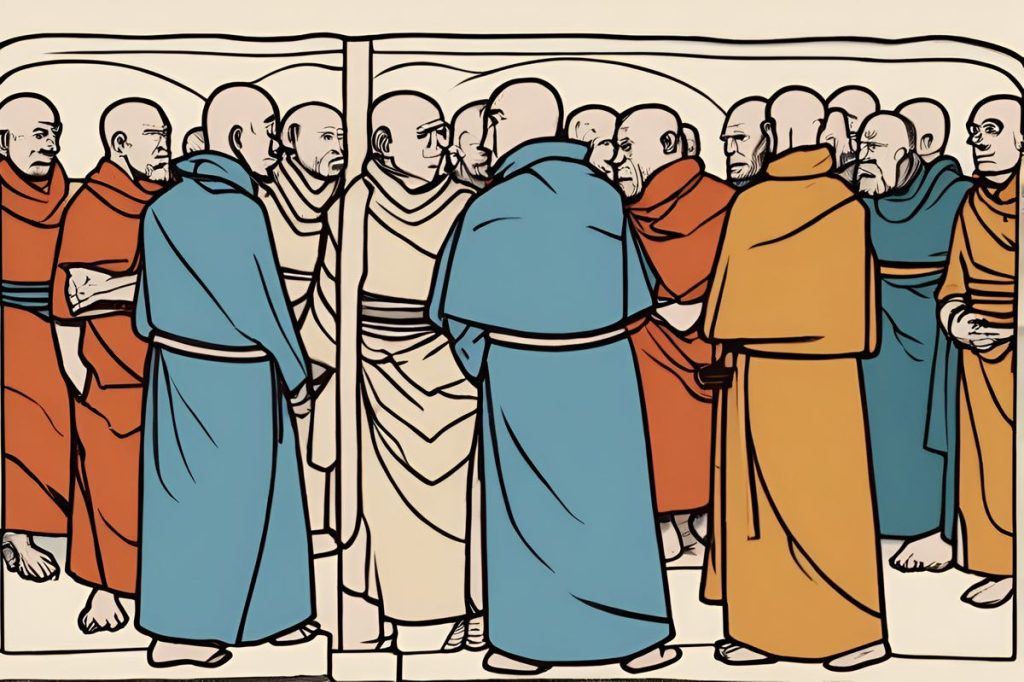The Osiou Avakoum monastery scandal has rocked Cyprus, with allegations of tax evasion, money laundering, and political interference dominating headlines. Monks from the monastery, along with members of the far-right party Elam, are at the center of the controversy, sparking demands for accountability and transparency as the scandal unfolds.
What are the main allegations in the Osiou Avakoum monastery scandal?
The Osiou Avakoum monastery scandal involves allegations of tax evasion and money laundering. Key players include monks from the monastery and members of the far-right party Elam. Other accusations are political interference, compromised law enforcement, and suspect Russian oligarch donations, all of which have sparked a national controversy demanding thorough investigation and accountability.
Tax Evasion and Money Laundering Allegations Erupt
The Osiou Avakoum monastery scandal has triggered a storm of controversy, escalating into a political debacle that has captured the nation’s attention. The key players in this unfolding drama include the monks of the monastery, located in the quaint village of Fterikoudi, and the far-right party Elam. Accusations of tax evasion and money laundering have been levied, bringing into question the reasons behind Elam’s involvement in the church’s affairs.
The discovery of €800,000 in cash and compromising footage of two monks has only added fuel to the fire. The incident took place on March 5 when the monastery found itself embroiled in a confrontation, leading to the transfer of the cash to the Tamassos bishopric for counting. The presence of Elam party leader Christos Christou, who retains parliamentary immunity, has been met with calls for investigation from Akel, Disy, and Diko parties. They demand clarity on how the police have managed the case and why Christou was present during the events. These developments have led to a broader discussion on accountability and the seemingly blurred lines between church operations and political interference.
Intriguing Presence and Ecclesiastical Court Proceedings
The implication of political figures and law enforcement officials in the scandal has raised serious questions. Former police chief Kypros Michaelides’s reported friendship with Tamassos Bishop Isaias has been put under scrutiny. Reports of around 30 individuals present at the monastery on the day of the incident, some allegedly hooded, have further deepened the mystery around the case.
The involvement of Elam’s chairman has not gone unnoticed. Christou’s defense that he was present as part of a throne committee did little to quell the suspicions of other parties. Diko has openly questioned the identity of the hooded individuals and their connection to Elam. Meanwhile, the monks’ lawyers have countered the allegations, asserting that the monks were set up and compelled to sign confessions and that the incriminating footage has been doctored. Police sought to clarify their role, stating that members were present to ensure security.
Ecclesiastical Wealth and Russian Connections
Akel MP Irene Charalambides has put the spotlight on the handling of the seized €800,000 and called for an investigation into the church’s finances by Cyprus’ money laundering unit, Mokas. She emphasizes the importance of the rule of law and points out suspiciously large donations from Russian oligarchs to the church. The Tamassos bishopric, known for housing Cyprus’ first “Russian-style church,” has received significant contributions from Russian businessman Vyacheslav Zarenkov.
The ecclesiastical court, which convened its first session recently, faces the daunting task of sifting through a mountain of evidence. Their goal is to conclude the proceedings before Easter, although given the complexity and volume of the case, this may prove challenging.
Legal Representatives and Observers in the Fray
The unfolding narrative has also pulled in notable legal figures. Michalis Vorkas, chairman of the bar association, was present when the cash was counted, leading to further speculation about the intertwining of legal, political, and ecclesiastical interests. Vorkas, maintaining his stance of being at the event in his professional capacity, has refrained from making additional comments.
This scandal has shed light on the intricate and often opaque relationship between the church, state, and political entities in Cyprus. With the investigation ongoing and the ecclesiastical court in session, the full extent of the ramifications from this controversy remains to be seen.
What are the main allegations in the Osiou Avakoum monastery scandal?
The Osiou Avakoum monastery scandal involves allegations of tax evasion, money laundering, political interference, compromised law enforcement, and suspect Russian oligarch donations. Monks from the monastery and members of the far-right party Elam are key players in this controversy, sparking demands for thorough investigation and transparency.
Who are the key players involved in the Osiou Avakoum monastery scandal?
The key players in the scandal include monks from the Osiou Avakoum monastery, members of the far-right party Elam, political figures like Elam’s chairman Christos Christou, law enforcement officials, and notable legal figures such as Michalis Vorkas. Their involvement has raised questions about the intersection of church operations, politics, and legal interests.
What is the significance of the ecclesiastical court proceedings in relation to the scandal?
The ecclesiastical court proceedings are crucial in unraveling the complexities of the Osiou Avakoum monastery scandal. With the goal of concluding the proceedings before Easter, the court faces the daunting task of examining the evidence and shedding light on the alleged tax evasion, money laundering, and political interference. The outcome of these proceedings will play a pivotal role in determining accountability and transparency in this controversy.
What role do Russian connections and ecclesiastical wealth play in the Osiou Avakoum monastery scandal?
The scandal has brought attention to the church’s finances, with calls for an investigation by Cyprus’ money laundering unit, Mokas. Suspiciously large donations from Russian oligarchs to the church, particularly the Tamassos bishopric, have raised concerns about the influence of foreign entities in ecclesiastical affairs. This aspect adds another layer of complexity to the scandal, highlighting the need for scrutiny and oversight in financial transactions involving religious institutions.

